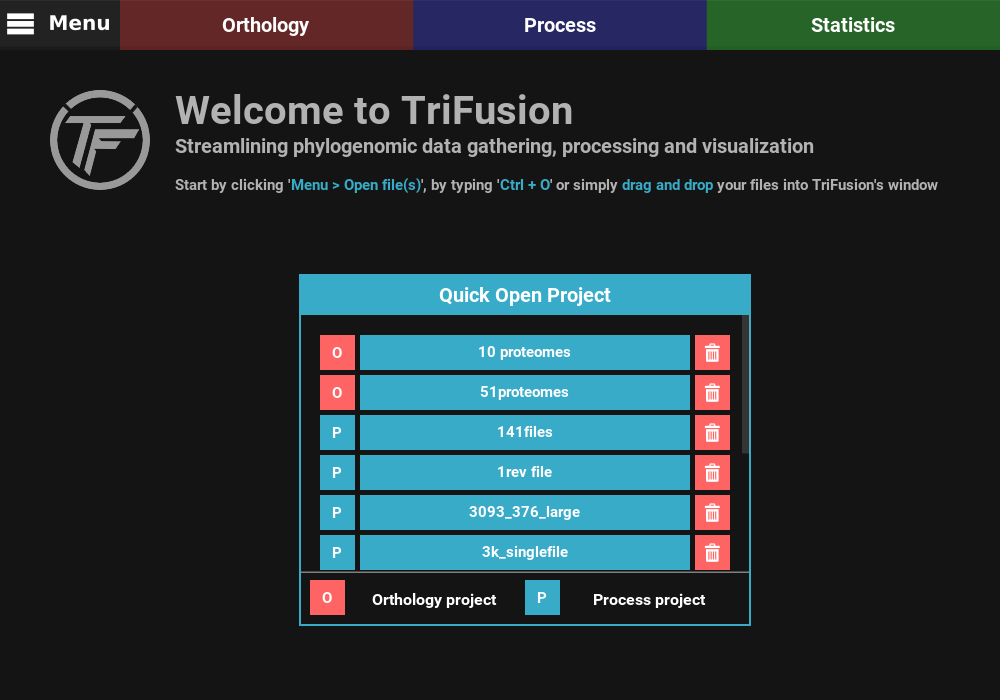Website: http://odiogosilva.github.io/TriFusion/
📢 ANNOUNCING: TriFusion 1.0.0 is live! 🎉 🎈
TriFusion is a modern GUI and command line application designed to make the life of anyone with proteome and/or alignment sequence data easier and more pleasurable. Regardless of your experience in bioinformatics, TriFusion is easy to use and offers a wide array of powerfull features to help you deal with your data. At the same time, it was developed to handle the enormous amount of data that is generated nowadays.
TriFusion is an open source, cross-platform application written in Python 2.7 and using the Kivy framework to build the graphical interface.
Here is an overview of what it can do for you across its three main modules.
- Searches for ortholog sequences across multiple species.
- Filters ortholog sequences according to the gene copy number and/or number of taxa present.
- Graphical visualization of ortholog data.
- Exports your orthologs as protein or nucleotide sequences.
- Conversion or concatenation of alignment files into several popular formats (check supported formats).
- Collapse identical sequences into the same haplotype.
- Create consensus sequences for each alignment with several options on how to handle sequence variation.
- Filter either alignments (according to whether they contain or exclude certain taxa, to a minimum proportion of taxa, and/or variable sites) or alignment columns (according to codon position, missing data and gaps).
- Code indel patterns of your alignments into a binary matrix that is appended to the alignment.
- Revert concatenated alignments or export sub-regions into individual files
- Set gene and codon partitions as well as substitution models (Nexus format)
- Create file/taxa groups to quickly perform operations on different sets of data.
- It's fast and memory efficient. Converting 3,093 files with 376 taxa can be performed in just 30 seconds and using less than 90Mb of RAM memory (check the benchmarks table).
- Provides instant information on overall and per gene summary statistcs.
- TriFusion offers dozens of graphical and statistical options to explore your data:
- General information plots.
- Polymorphism and sequence variation plots.
- Missing data plots.
- Outlier plots.
- Publication ready figures
The latest stable release of TriFusion can be installed as a standalone application using one of the following installers. This only includes the GUI component of TriFusion. If you also want the command line version, see Installation from source.
-
Debian package based (See list): TriFusion-1.0.0rc1.deb
-
RPM package based (See list): TriFusion-1.0.0rc1.rpm
-
ArchLinux/Manjaro (See list): TriFusion-1.0.0.tar.xz is available on AUR.
Executing the TriFusion installer may generate a warning from SmartScreen. To continue with the installation, click the "More info" label and then "Run anyway".
TriFusion is on PyPi and can be easily installed with pip.
# Install locally, without sudo permissions, using the --user flag
pip install trifusion --user
Note that TriFusion is a python2 application, so make sure that your pip is from the correct python version. If python3 is the default installation on your machine, you may need to run pip2 instead.
By itself, this command will only install the command line version of TriFusion. If you want to install the complete TriFusion package with the GUI libraries, follow these instructions according to your operating system.
If you are unconvinced that a terminal version would be useful/pratical, check out how easy and fast it is to use TriFusion to process 614 Fasta alignments into phylip and nexus output formats :-):
Tutorials on how to use TriFusion for its many tasks can be perused here.
You can download TriFusion User Guide here.
When using OrthoMCL to find ortholog clusters, please cite the original software:
Fischer, S., Brunk, B. P., Chen, F., Gao, X., Harb, O. S., Iodice, J. B., Shanmugam, D., Roos, D. S. and Stoeckert, C. J. Using OrthoMCL to Assign Proteins to OrthoMCL-DB Groups or to Cluster Proteomes Into New Ortholog Groups Current Protocols in Bioinformatics. 2011 35:6.12.1-6.12.19.
We're working on a manuscript for TriFusion now.




